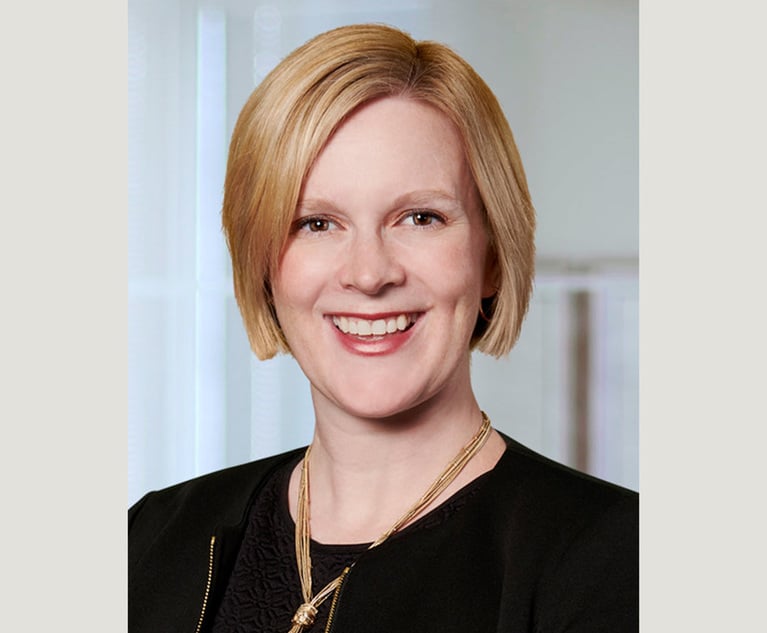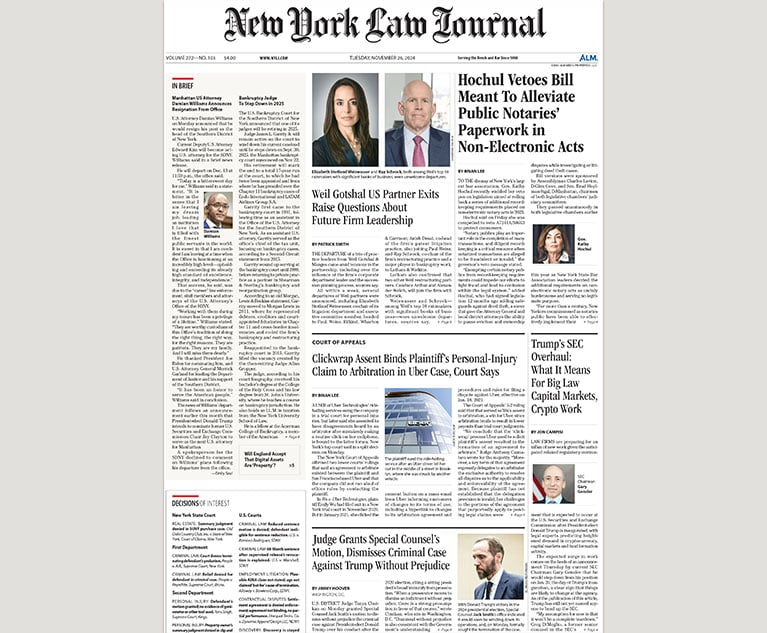 Manhattan Supreme Court at 60 Centre Street. Photo: Rick Kopstein/NYLJ
Manhattan Supreme Court at 60 Centre Street. Photo: Rick Kopstein/NYLJEx-Moses & Singer Partner Says Firm Forced Him to Borrow Money, Then Fired Him
No rational person would borrow $1 million from the law firm that just fired him, Stephen Weiss contends in a filing.
January 24, 2020 at 01:44 PM
5 minute read
A former Moses & Singer partner is accusing the firm of loaning him $1.173 million under fraudulent terms, immediately before ejecting him from the firm.
Stephen Weiss alleges he was fired from the New York and New Jersey-based law firm on the same day he signed the note. In a new filing made Wednesday in New York County Supreme Court, Weiss argues that a lawsuit Moses & Singer brought against him last year should be thrown out in part because his former bosses never told him they were planning to boot him from the firm years before.
"No rational person would, upon learning he had been terminated, proceed to sign a note purportedly requiring him to pay over $1 million to his now-former employer, with an exorbitant interest rate, that he had no obligation to pay (legal or otherwise)," Weiss wrote in the pro se filing.
Moses & Singer sued Weiss in December, alleging he owed $1,158,000 in principal and at least $582,637 in interest that continues to accrue by $407.63 a day.
Weiss alleges he borrowed the money from the firm because his bosses—Jay Fialkoff, the firm's managing partner, and Alan Kolod, the chairman of the management committee—were upset by his "meager" contribution to their legal malpractice settlement with E-Pass Technologies.
A former client of Weiss and the firm's, E-Pass accused them of filing meritless patent-infringement cases on a credit card-related patent in 2000. E-Pass suffered multiple losses in federal court and had to pay at least $7.6 million in fees to Weiss and the firm, and at least $2.3 million to the defendants.
Weiss claims the firm knew the only money he had was in his 401K, which was worth about $600,000 at the time, and that he would only be able to contribute a limited amount to the E-Pass settlement. On Nov. 14, 2012, two days before the settlement was entered into a court docket, Weiss rejected Kolod's suggestion that Weiss withdraw everything from his 401K and instead withdrew only $150,000, according to his filing.
Weiss wrote that he signed the note Nov. 20, the same day he met with Fikoff and Kolod in New York. According to Weiss, they were unhappy with the size of his current contribution to the settlement and told him he had to borrow more from the firm.
"Then, to Weiss's surprise, they presented Weiss for the first time with the note, which they made clear was not negotiable, and that if Weiss wanted to stay with the firm, he had to sign it," Weiss wrote in his reply.
Weiss argues that he wasn't obligated to borrow the money, as the settlement with E-Pass already required the firm to pay as well as his own $150,000 contribution, but he did so anyway because he wanted to maintain his relationship with the firm. To satisfy the loan, the firm would take a percentage of his monthly draw, according to Weiss. The firm also placed a lien on any money Weiss recovered from the terrorism cases he had been working on.
Weiss agreed to both the loan and the lien. But the firm fired him "virtually immediately" after he signed everything, locking him out of the office and taking him off the website, he alleges.
"Given the timing, it is clear that M&S made the decision to terminate him, and the scheme to do so upon his signing the note, prior to the November 20th meeting," Weiss wrote.
After getting fired, Weiss established his own practice and continued to represent some of the victims of the 1998 U.S. embassy bombings in Tanzania and Kenya. The victims sued the governments of Sudan and Iran, and initially won a $10.2 billion default judgment against. The damages were paid down to $6 billion and the case is pending before the U.S. Supreme Court.
The law firm managing the case, the Fay Law Group, threw Moses & Singer off the case and began working with Weiss. Weiss accuses his former firm of botching its claim to fees for the work they did on the case while he was there, saying they waited too long to press their claims with Fay.
Weiss claims he proposed to Moses & Singer that they go after Fay for the fees Weiss is owed from his work as a sole practitioner, but the firm never responded to his proposal. In November, the firm told Weiss he had three days to pay back the $1.74 million he allegedly owed the firm.
From December 2013 to May 2016, Weiss did cut a series of checks worth a total $14,500 to Moses & Singer. He claims he did so in an effort to forestall any potential litigation in the hopes that fees from the terrorism cases would start rolling in soon, even though it might hurt his legal arguments later.
Weiss declined to comment. The Moses & Singer attorneys representing the firm in its lawsuit against him did not respond to requests for comment.
This content has been archived. It is available through our partners, LexisNexis® and Bloomberg Law.
To view this content, please continue to their sites.
Not a Lexis Subscriber?
Subscribe Now
Not a Bloomberg Law Subscriber?
Subscribe Now
NOT FOR REPRINT
© 2024 ALM Global, LLC, All Rights Reserved. Request academic re-use from www.copyright.com. All other uses, submit a request to [email protected]. For more information visit Asset & Logo Licensing.
You Might Like
View All
How My Postpartum Depression Led to Launching My Firm’s Parental Leave Coaching Program
9 minute read
Patent Trolls Come Under Increasing Fire in Federal Courts
Trending Stories
Who Got The Work
Michael G. Bongiorno, Andrew Scott Dulberg and Elizabeth E. Driscoll from Wilmer Cutler Pickering Hale and Dorr have stepped in to represent Symbotic Inc., an A.I.-enabled technology platform that focuses on increasing supply chain efficiency, and other defendants in a pending shareholder derivative lawsuit. The case, filed Oct. 2 in Massachusetts District Court by the Brown Law Firm on behalf of Stephen Austen, accuses certain officers and directors of misleading investors in regard to Symbotic's potential for margin growth by failing to disclose that the company was not equipped to timely deploy its systems or manage expenses through project delays. The case, assigned to U.S. District Judge Nathaniel M. Gorton, is 1:24-cv-12522, Austen v. Cohen et al.
Who Got The Work
Edmund Polubinski and Marie Killmond of Davis Polk & Wardwell have entered appearances for data platform software development company MongoDB and other defendants in a pending shareholder derivative lawsuit. The action, filed Oct. 7 in New York Southern District Court by the Brown Law Firm, accuses the company's directors and/or officers of falsely expressing confidence in the company’s restructuring of its sales incentive plan and downplaying the severity of decreases in its upfront commitments. The case is 1:24-cv-07594, Roy v. Ittycheria et al.
Who Got The Work
Amy O. Bruchs and Kurt F. Ellison of Michael Best & Friedrich have entered appearances for Epic Systems Corp. in a pending employment discrimination lawsuit. The suit was filed Sept. 7 in Wisconsin Western District Court by Levine Eisberner LLC and Siri & Glimstad on behalf of a project manager who claims that he was wrongfully terminated after applying for a religious exemption to the defendant's COVID-19 vaccine mandate. The case, assigned to U.S. Magistrate Judge Anita Marie Boor, is 3:24-cv-00630, Secker, Nathan v. Epic Systems Corporation.
Who Got The Work
David X. Sullivan, Thomas J. Finn and Gregory A. Hall from McCarter & English have entered appearances for Sunrun Installation Services in a pending civil rights lawsuit. The complaint was filed Sept. 4 in Connecticut District Court by attorney Robert M. Berke on behalf of former employee George Edward Steins, who was arrested and charged with employing an unregistered home improvement salesperson. The complaint alleges that had Sunrun informed the Connecticut Department of Consumer Protection that the plaintiff's employment had ended in 2017 and that he no longer held Sunrun's home improvement contractor license, he would not have been hit with charges, which were dismissed in May 2024. The case, assigned to U.S. District Judge Jeffrey A. Meyer, is 3:24-cv-01423, Steins v. Sunrun, Inc. et al.
Who Got The Work
Greenberg Traurig shareholder Joshua L. Raskin has entered an appearance for boohoo.com UK Ltd. in a pending patent infringement lawsuit. The suit, filed Sept. 3 in Texas Eastern District Court by Rozier Hardt McDonough on behalf of Alto Dynamics, asserts five patents related to an online shopping platform. The case, assigned to U.S. District Judge Rodney Gilstrap, is 2:24-cv-00719, Alto Dynamics, LLC v. boohoo.com UK Limited.
Featured Firms
Law Offices of Gary Martin Hays & Associates, P.C.
(470) 294-1674
Law Offices of Mark E. Salomone
(857) 444-6468
Smith & Hassler
(713) 739-1250








